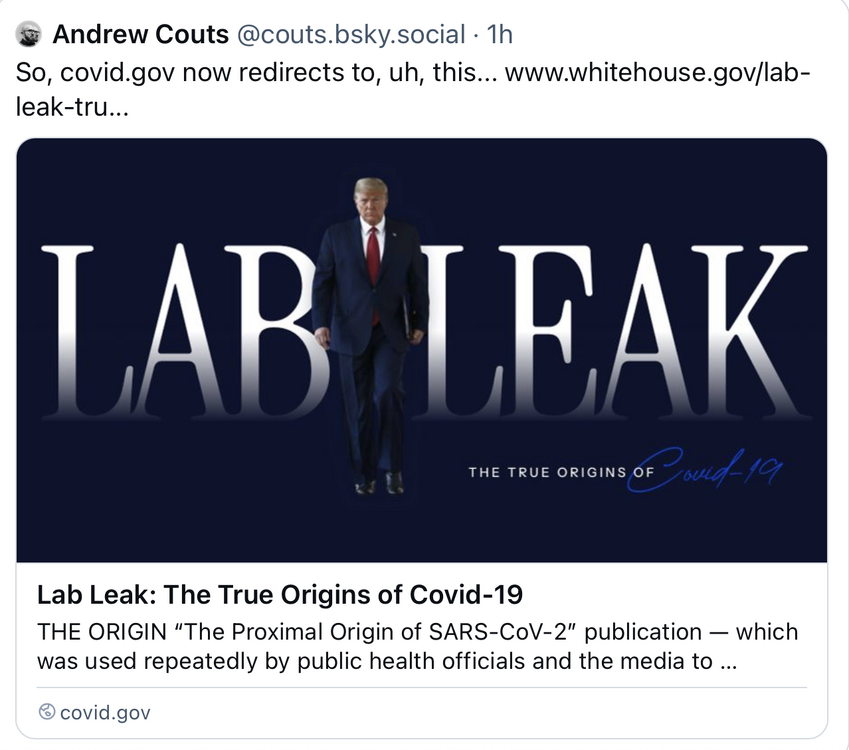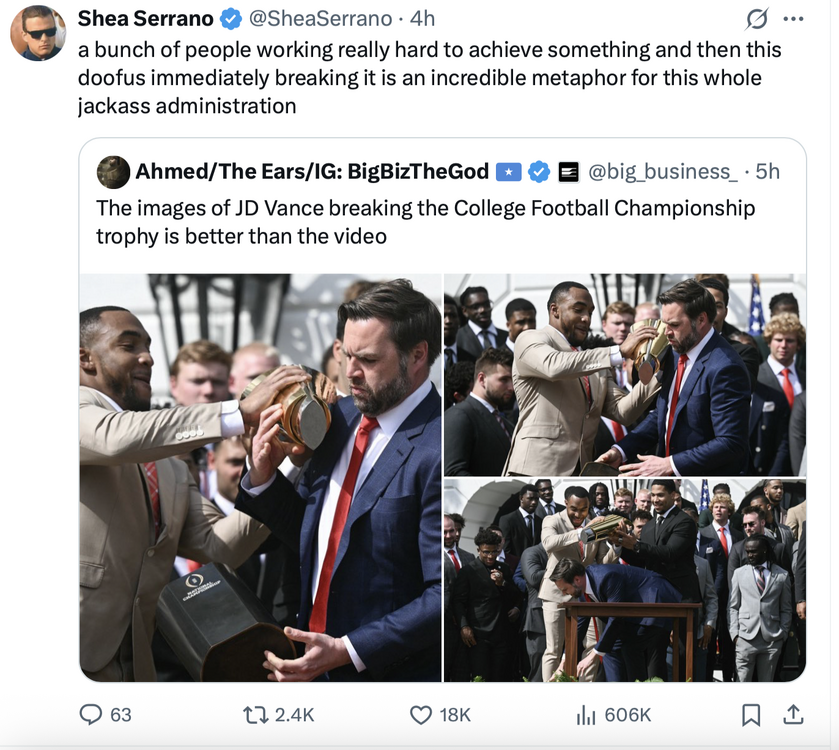
Everything posted by Francisco 2.0
-
Trump’s El Salvador Gulag
- Trump’s America
- Trump’s El Salvador Gulag
As if you had to ask.- America's Foreign Policy & Other Shit Going On Around the World thread
But I was told one phone call could end this.- Trump’s America
- Trump’s America
What could possibly go wrong.- Trump’s America
- Elon Musk: Nazi traitor piece of shit [Confirmed]
https://arstechnica.com/cars/2025/04/tesla-makes-its-cars-lie-about-their-mileage-lawsuit-claims/- Trump’s America
https://arstechnica.com/tech-policy/2025/04/trumps-fcc-chair-threatens-comcast-demands-changes-to-nbc-news-coverage/- People trying to bring the Shuttle Discovery to Texas
Estimated cost of moving the shuttle: $1 billion https://arstechnica.com/space/2025/04/why-are-two-texas-senators-trying-to-wrest-a-space-shuttle-from-the-smithsonian/- Severance (Apple TV)
Wife and I are still processing what we finished up on Sunday evening. My idea, and I'm sure others have had the same, and it disturbed my wife when I mentioned it:- Elon Musk: Nazi traitor piece of shit [Confirmed]
- Trump’s El Salvador Gulag
- Trump’s El Salvador Gulag
I'll be honestly surprised if Senator Van Hollen returns home alive. And you can bet your ass Trump would just shrug his shoulders if he doesn't.- DOGE: America Fucking Around
Oh, this will end in tears.- So excited to go to the SEC with these Tennessee assholes
Um. Nico doesn't own his NIL rights until December 31, 2025. https://www.nytimes.com/athletic/6275827/2025/04/14/tennessee-football-nico-iamaleava-holdout-transfer/- Trump’s El Salvador Gulag
- Tariff wars, they have began
- Tariff wars, they have began
Story from last week; didn't see if it was posted. The farmer in it; his political stance is not mentioned. But I'd find it hard to believe he voted for Harris. https://www.theatlantic.com/ideas/archive/2025/04/recession-tariffs-canada-trump/682297/- Tariff wars, they have began
Sorry Boeing, we know you have enough on your plate as it is. https://www.bloomberg.com/news/articles/2025-04-15/china-tells-airlines-stop-taking-boeing-jets-as-trump-tariffs-expand-trade-war?embedded-checkout=true- Trump’s El Salvador Gulag
- JD Vance Fucked 5 couches as a hillbilly, then went on to kill the pope
- Severance (Apple TV)
Wife and I are late to the party. We just started watching Season 1 about a month ago, and finished Season 2 last night. So, so good.- Wes Anderson's next film, The Phoenician Scheme
Oh hell yes.- Tariff wars, they have began
The best people.Football ... Basketball ... Baseball ... Other Sports ... Futbol ... 🤫995🤫 ... Gambling ... Movies & TV ... Music ... Hobbies ... Lulz ... Food & Travel ... Daily Texan ... Business & Markets ... Cloak Room ... Help ... For Sale ... Board Discussion ... Advertise... Tailgate DonationsBack to topAccount
Navigation
Search
Configure browser push notifications
Chrome (Android)
- Tap the lock icon next to the address bar.
- Tap Permissions → Notifications.
- Adjust your preference.
Chrome (Desktop)
- Click the padlock icon in the address bar.
- Select Site settings.
- Find Notifications and adjust your preference.
Safari (iOS 16.4+)
- Ensure the site is installed via Add to Home Screen.
- Open Settings App → Notifications.
- Find your app name and adjust your preference.
Safari (macOS)
- Go to Safari → Preferences.
- Click the Websites tab.
- Select Notifications in the sidebar.
- Find this website and adjust your preference.
Edge (Android)
- Tap the lock icon next to the address bar.
- Tap Permissions.
- Find Notifications and adjust your preference.
Edge (Desktop)
- Click the padlock icon in the address bar.
- Click Permissions for this site.
- Find Notifications and adjust your preference.
Firefox (Android)
- Go to Settings → Site permissions.
- Tap Notifications.
- Find this site in the list and adjust your preference.
Firefox (Desktop)
- Open Firefox Settings.
- Search for Notifications.
- Find this site in the list and adjust your preference.
- Trump’s America









